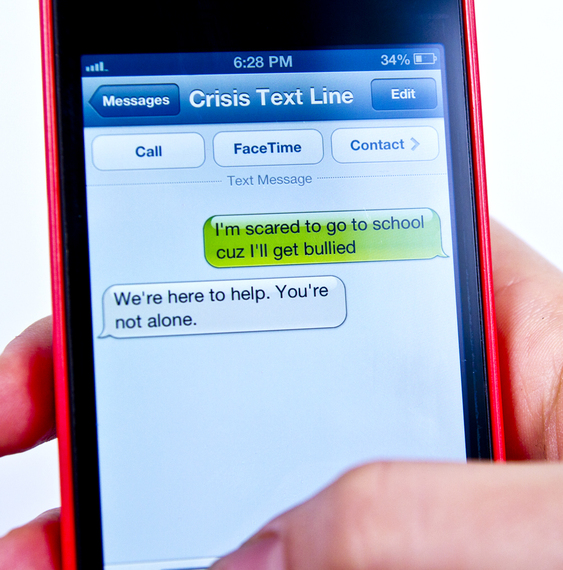By Jared Wolf
When Crisis Text Line, the nation's first free, 24/7, nationwide text line, was founded, it was aimed at teens. It makes sense: teens text a lot, they need emotional support, and, oh yeah, they text a lot. Numbers don't lie: the service has processed over 8 million text messages in just over two years.
Today, we're here to support people of all ages and backgrounds. We're always learning new things about the ways people use Crisis Text Line, and every now and then, a message surprises us.
In 2014, one of our crisis counselors received a message that read, "I can't call suicide hotlines because I can't hear, so I was hoping I could use this service."
And there are more texts just like it: "I'm deaf and I've been feeling down lately," started one conversation. (The same conversation ended with, "Thank you for helping and being there for me.") In total, over 100 of our texters have told us they're deaf, and that's probably just the tip of the iceberg.
It turns out that for many people with hearing loss, Crisis Text Line is a lifeline. Text can be a great equalizer, granting access to free, 24/7 crisis care to people who would otherwise not have had it. Hearing or deaf, just about anyone can text.
It's meant a lot to us to discover the unique role our service plays for so many people in D/deaf and hard of hearing communities, but we're ready to do more, and to do better. (Here's where you can learn more about the difference between "Deaf," "deaf," and "hard of hearing.)
That's the challenge I've been asked to address as Training Intern with Crisis Text Line. First off, how do we make our training accessible to people with hearing loss without losing any of the important information that makes our crisis counselors as strong as they are? This is a community full of people with the skills and drive to be amazing crisis counselors, who deserve the same great training experience.
Adding closed captioning on our training videos, and providing chat-based training sessions as an alternative to video conference-based sessions are a start. The next step will be integrating American Sign Language interpreters and transcribers into all of our training sessions.
Second, how do we reach out to this community to bring greater awareness of the service to potential texters and potential crisis counselors? We're aiming to accept 50 deaf/hard of hearing people into training this Fall. (Interested? Apply by September 22!) Our partnerships certainly help, but the key will be word of mouth.
Third, how do we address the specific mental health needs of our deaf and hard of hearing texters? Providing accessible resources and culturally-competent support needs to be a priority. Bringing in health care providers experienced in working with the Deaf community will help us to ensure that our work is sensitive to their specific needs.
It's a learning process, and a rewarding one. We've made some kickass partners along the way: Center for Hearing and Communication, one of New York City's two mental health care providers for the deaf, has provided expertise on accessibility and mental health; Rikki Poynter, who is Deaf, gave us a big shout-out on her popular YouTube channel; and SayWhat Club sent recruitment info to its 1,000+ online members.
We're just getting started, and we're very excited. We can't wait to see the impact a fully-accessible Crisis Text Line will have.
Learn more about joining our team as a crisis counselor.
Jared Wolf is a Training Team Intern and a volunteer crisis counselor at Crisis Text Line. His passions are mental health advocacy and Kelly Clarkson. In his free time he writes and performs stand-up comedy.
